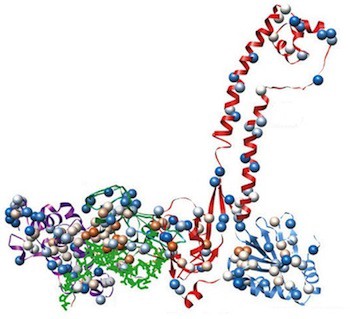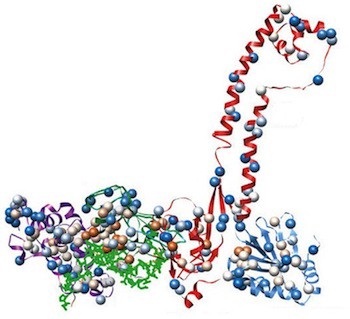The BRCA Gene, Our Mother, And Our Insurance Plans: A Chat Between Sisters
by Hannah Killian and Meredith Askey


On Monday, Angelina Jolie quietly published an op-ed in the New York Times in which she admitted to undergoing a preventative double mastectomy. Jolie, whose mother died from breast cancer, carries the “faulty” BRCA1 gene, which increases the risk of developing breast cancer and ovarian cancer.
Our own mother was diagnosed with breast cancer in 2006. She had radiation and chemotherapy and has now been cancer-free for more than five years, but last year she tested positive for the BRCA2 mutation, and she is petrified that she has passed it on to us (we’re 26 and 30 years old). She desperately wants us to get tested for the gene, and has offered to pay the costs. She’s been on us for months about calling her oncologist.
We’ve been putting it off, though, and when Jolie’s piece came out we were reminded of our mother’s mission. We chat throughout the day while we’re both at work. Yesterday our talk was about the BRCA gene, what a positive result might mean for us, and how it might affect our health care coverage now and in the future. We learned a lot.
Tuesday, May 14, 2013–9:27 AM
Hannah: Hey have you done anything about getting tested for that breast cancer gene thingy?
Meredith: I haven’t, although Mom reminded me again on Sunday.
Hannah: I can think of about 5,000 things I’d rather spend that money on, but I hear that preventative stuff is good for you or something.
Meredith: I want to call my insurance company to find out what will be covered and to what extent. Mom acts like thinking about the cost is ridiculous.
Hannah: Well, she said she’d pay for it, didn’t she?
Meredith: Yes, but I still want to know going in
And what if we have the gene, and [mom’s oncologist] recommends immediate yearly mammograms but insurance still doesn’t cover it until age 35? Is mom planning to pay for all those mammograms?
Hannah: I don’t know, dude.
Meredith: I don’t think she believes there’s a chance it won’t be covered, whereas I’m almost positive there will be at least some out-of-pocket costs that will add up to a lot.
1:47 PM
Meredith: Another question to ask: If you test positive, that becomes a pre-existing condition for you. I have insurance through my job, but you technically have an individual plan.
You need to ask what it would mean for your rates the next time you renew or if you would need to switch insurance.
2:06 PM
Meredith: Hey, the test is not covered for me at all until my deductible is met, which it is not yet. They’re calling me back by tomorrow to estimate how much it would cost.
if MY insurance doesn’t cover it, I am preeeeeety sure yours won’t
2:25 PM
Hannah: My deductible is $2500 and they’ll cover 80% after that. so: not covered.
Meredith: Right. They do have to mail me an authorization form, so make sure you get that awhile if you need it.
Hannah: I doubt I asked the right questions. he kept going on about needing the code to give me more information, but just gave me the basic information for a diagnostic test
Meredith: I said I wanted to get tested for the BRCA breast cancer gene because my mother has a positive test, and was that covered?
and she said it would be covered at 90% after my deductible is met, and that she needed to send me an authorization form that either I or my doctor could fill out and return before actually doing the test.
Hannah: yeah… that’s basically what I said. he said he needed a code.
Meredith: I think there are different combos of procedure codes they might use to bill for this test
Hannah: Well, this is honestly the first time in my life I’ve thought about combination procedure codes.
it’s just so weird. like… if Facebook were this complicated to use, no one would have Facebook
Meredith: BINGO
and it’s to their advantage that it’s hard for you to use, because most people just trust what the bill says when they pay for healthcare.
Did you not even bother asking about the pre-existing condition thing?
Hannah: Uttering the phrase pre-existing condition did not even cross my mind. How do you know how to do this stuff? did I not read some pamphlet about adult-y questions to ask?
Meredith: I don’t, but I hear things on the news
Hannah: I read the news but am very self-centered and believe it doesn’t apply to me.
Meredith: Like, as long as you have continuous coverage you can’t be refused coverage
but I don’t know whether on an individual plan like you have they can use a new condition like that to raise your rates
And I would like some more info from [mom’s oncologist] first, I think, because if your healthcare decisions wouldn’t change in any way until you hit 35, then I think maybe it’s NOT worth it for you to get tested yet
The risk of having this as a pre-existing condition if you wouldn’t start getting mammograms until age 30 or 35 anyway is not worth it for you.
Hannah: I realize that I am young and that I am self-centered and that I do not fully grasp the concept of my own mortality
But this, to me, just seems like the most absurd thing to spend money on
There is really just something that rubs me the entirely wrong way about spending thousands of dollars on a test for something that possibly could or could not happen in the future when there are gazillions of other things to spend thousands of dollars on
is it absurdly naive to say that I would rather mom donate this money for someone else to get medical care in a developing nation rather than spend it on me to get some test?
I realize that mom is my mother and doesn’t see it that way. She wants to help me — her child and little girl — but I just am having trouble wrapping my head around the absurdity of the situation.
Meredith: I truly think she will not let herself see that this is NOT a cut-and-dry decision
Hannah: I do not want to just jump in to the test
Meredith: me neither, I want to know exactly what it would mean if it was positive first
and not just what it would mean for our risk, but what it would mean in terms of recommended treatment — like, when would they want to start screenings
and there MUST be more to consider beyond “have your ovaries removed as soon as you’re done having children.” I want to know what less invasive screening options there are
Hannah: I guess I just don’t even think about my health that much besides recognizing that I would be a little healthier if I lost a few pounds
Meredith: right: you’re a cliched reasonably healthy 20-something
Hannah: I will happily be that cliche
Meredith: It makes no sense to me to get this test before the results would change anything about your current healthcare. Maybe with a positive test they’d recommend a mammogram right away and every few years to establish a baseline before regular mammograms start at age 35? But even if that would be the recommendation, I wonder if it would be more cost-effective to not risk the pre-existing condition.
I mean, so if you have the BRCA2 that means your overall risk for getting cancer sometime in your life is much higher, but it’s still not a high risk of developing cancer before you’re, say, 30. and even with the gene that’s pretty rare. LESS rare, but still rare
Hannah: I think that a consult with [mom’s oncologist] should be our next step
because she will look at this more scientifically and logically like you do
and not mom’s “MY BABIES HAVE CANCER AND ARE GOING TO DIE!!!!!!!!!!!!!!!!!”
Meredith: I just need to remind myself to not get annoyed at mom about it
like, it’s not OK to respond to her with anything beyond “OK yes we are going to go get tested ASAP”
And I am thinking about it from [a mother’s] standpoint. maybe I’ll feel differently if I do test positive, but I don’t think so. [My daughter] is absolutely not getting tested for this until she’s an adult and can make the decision for herself. Plus, who knows what advances in treatment will have happened by then.
Seriously, this is exactly the point in GATTACA
did you see that movie?
Hannah: I have not seen Gattaca
Meredith: Where do you draw the line for treating people differently when you know their genome and therefore know the traits they have a higher or lower tendency towards?
There aren’t good regulations in place for what it is and isn’t OK to assume about people once their genome is mapped
like, it should NOT, in my opinion, change your access to health insurance if you should test positive for this gene. But it does.
and even after Obamacare makes it illegal to refuse insurance based on pre-existing conditions, they can still charge you way more for it
I do believe healthcare is a right, but I do think there are major grey areas — like, if you choose to smoke your whole life and you get lung cancer? Or you have a heart attack at age 40 because you eat three Big Macs a day? That’s understandably something people don’t want to pay for
but EVERYONE makes SOME imperfect decisions about their health, and there’s often not one clear cause of major health problems, so it’s not possible to determine how much the individual is at fault
so what do you do about that? obviously you and I can’t control whether we have the BRCA2 mutation or not
but what if they found that you could lower your risk back to normal by eating nothing but broccoli and carrots for the rest of your life? Should it be my responsibility to follow that very restrictive diet? Even though I now have a much harder job than the average person?
Or should it be the responsibility of the healthcare system to screen me more so that I can keep eating normal food?
No easy answer.
THESE ARE THE THINGS THAT MAKE PEOPLE FREAK OUT ABOUT TURNING 30 HANNAH wtf
Hannah: dude.
Chat has been condensed and edited. Image via Flickr.
Meredith Askey is a data analyst and mom. Hannah Killian is a librarian and aunt. Last month they saw Matilda the Musical together. This morning, they made consultation appointments with their mother’s oncologist.